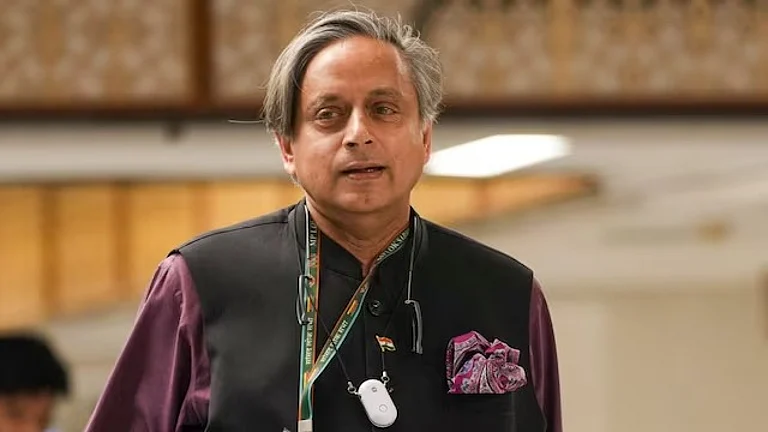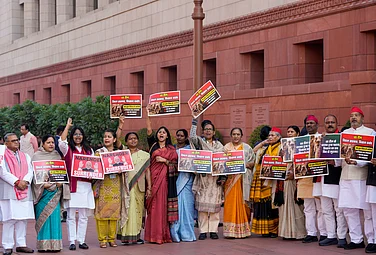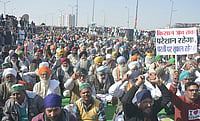The political landscape of the United States is expected to change after Tuesday with the results of the mid-term elections.
Americans on Tuesday are voting in the mid-term elections. Elections are being held to elect several members of the US Senate, House of Representatives, and state legislatures. Voters are also electing governors of 36 of the 50 American states.
Unlike India, there is a strict division of powers between the Legislature and the Executive in the United States, which means that the President of the United States is elected separately and the Legislature is elected separately. If the party opposed to the President secures majority in the Legislature, the White House faces stiff resistence in its agenda.
For now, President Joe Biden's fellow Democrats enjoy a thin majority in the US Legislature, but that might change with the mid-term polls. Both the Democrats and Republicans are trying to woo the Indian-American community, which has emerged as a powerful electoral bloc in recent years.
Here we explain what are US mid-term polls, the forecasts so far, key Indian-American candidates, and the focus on the Indian-origin voters.
What are US mid-term polls?
Mid-term elections called so because they occur during the middle of a presidential term.
Presidential elections were held in 2020. Now in 2022, in the middle of Biden's presidential tenure, the elections being held are called mid-term.
The US parliament is called US Congress. It has two chambers named US House of Representatives and US Senate. The House has 435 seats and Senate has 100 seats.
CNN reports that 35 seats of Senates and all 435 House seats are going to polls on Tuesday. Moreover, 36 governors and several state legislatures are also facing elections.
US mid-term elections significance
The US mid-term elections are significant as the United States is deeply divided among ideological and political lines.
The Democrats' majority of House and Senate is very thin, with Vice President Kamala Harris serving as the 51st tie-breaking vote in the Senate. Kamala serves as the President of Senate, similar to the Speaker in India. Therefore, the Republicans need just one seat to gain majority in Senate. In the House, Republicans need five seats to gain the majority.
If Republicans secure majority, the legislative agenda of Biden and fellow Democrats is bound to be stalled. It comes at a time when Biden is pressing for climate change measures, abortion rights, voter rights, gun regulations, etc.
The US President depends on the US Congress to fund the government as budget is passed by the Congress. If a party opposed to the President wins Congress, then it might lead to a gridlock where budget's passage is delayed because of ideological and political tussle. This leads to shutdowns where the government runs has no money to run its offices and pay salaries.
Republicans are expected to win majorities in the US Senate and House, according to polling forecaster and analysis wesbite FiveThirtyEight.
"Republicans have a 59 per cent chance of winning the Senate and an 84 per cent chance of winning the House," reported FiveThirtyEight.
The Indian-Americans in US mid-terms
Both the Democrats and Republicans are wooing persons of Indian heritage as they are influential in several areas.
Outlook earlier reported, "The political power of these communities lies not in their absolute numbers but in their ability to be swing voters. Indian-American voters have shown to have the ability to sway the elections in favour of either one of the candidates."
"With an estimated 1.8 million eligible voters, Indian-Americans form a tinier than tiny part of the US electorate. But they look heftier because of their weighted equity in battleground — also called swing — states won or lost by slim margins in close contests. Just three of them swung it for Trump in 2016 — Michigan, Pennsylvania and Wisconsin; by 0.2, 0.7 and 0.8 percentage points respectively," reported Hindustan Times earlier.
While persons of Indian heritage have traditionally been Democrat-leaning, a large section has come out to support the Republicans in recent days, with former President Donald Trump particularly seeking Hindus.
Outlook earlier reported, "Trump appealed to the right wing and right-leaning Indian Americans, particularly Hindus, and claimed to be a 'big fan of Hindus'. The Republican Hindu Coalition campaigned for Trump and some of his biggest supporters were persons of Indian origin, such as Chicago-based businessman Shalabh Kumar."
With Kamala at his side, who is of Indian origin, Biden is also reaching out to the persons of Indian origin, including Hindus. This year on Diwali, Biden and Kamala hosted a largest-ever celebration of the Hindu festival at White House and invited several leading Hindu Americans of Indian heritage.
The Washington Post reports there are several persons of Indian heritage in key positions in the Biden administration and Democrats are counting on this representation to woo the community. The report noted that Indian-Americans can swing the Senate race in Georgia.
Indian-Americans are also turning active political activities with donations.
"Politicians are increasingly turning to the Indian diaspora for donations as well, as the group becomes more politically active. Indian American donors gave $20 million to $30 million to political candidates from both parties in 2020 — a record for the community," reported The Post, quoting Sanjeev Joshipura, executive director of Indiaspora, a non-partisan group of Indian American leaders
Indian-Americans candidates in US mid-term polls
There are five prominent Indian-American candidatse in the US mid-term elections.
PTI reports that there are four incumbents –Ami Bera, Raja Krishnamoorthi, Ro Khanna, Pramila Jayapal- who are likely to be re-elected. All four are from the Democratic Party. The fifth candidate is Shri Thanedar.
Ami Bera
Ami Bera, 57, is seeking his sixth term in the House of Representatives from the 7th Congressional District of California.
Bera has represented California's 7th Congressional District since 2013.
Bera is currently a member of the House Foreign Affairs Committee, where he serves as Chairman of the Subcommittee on Asia, the Pacific, Central Asia, and Nonproliferation, according to his biography on House website.
Ro Khanna
Khanna, 46, represents the 17th Congressional district from California. He is currently serving his third term and is seeking office for the fourth time.
Khanna is believed to belong to the progressive wing of Biden's Democratic Party.
"He sits on the House Agriculture, Armed Services, and Oversight and Reform committees, where he chairs the Environmental Subcommittee. Khanna is also the Deputy Whip of the Congressional Progressive Caucus; serves as an Assistant Whip for the Democratic Caucus and is the Democratic Vice Chair of the House Caucus on India and Indian Americans," says his official biography.
Raja Krishnamoorthi
Krishnamoorthi, 49, represents the 8th Congressional District of Illinois. He is seeking his fourth consecutive term.
If elected, Krishnamoorthi would be the fifth Indian-American in the next Congress along with Bera, Khanna, Krishnamoorthi and Jayapal.
Krishnamoorthi serves on the following committees: Committee On Oversight And Reform, House Permanent Select Committee on Intelligence, House Select Subcommittee on the Coronavirus Crisis.
Krishnamoorthi has also been involved in caucuses on abortion rights, LGBTQ community issues, and other health-related issues, among others.
Pramila Jayapal
Jayapal, 57, was born in Chennai. She is the first ever and only Indian-American woman to be elected to the House of Representatives.
Jayapal is the head of the progressive wing of the Democratic Party. She has also been critical of the Narendra Modi government in recent years.
"In Congress, Representative Jayapal has been a leader on immigration, including fighting the Trump Administration’s inhumane policies of separating children from their parents and crafting legislation to create a fair and humane immigration system. She has also championed legislation to address income inequality, such as the $15 minimum wage and expanded collective bargaining rights for workers," notes her official biography.
Shri Thanedar
Shri Thanedar is an entrepreneur and businessman.
Thanedar is seeking his election is seeking his maiden entry into the House of Representatives from the heavily African American portion of Detroit.
Besides these candidates, PTI reports that another Indian-American seems to be all set to create history in the State of Maryland.
"Aruna Miller, 57, a former member of the Maryland House of Delegates, is running as Lt Governor of the State on the Democratic ticket," reports PTI.

























